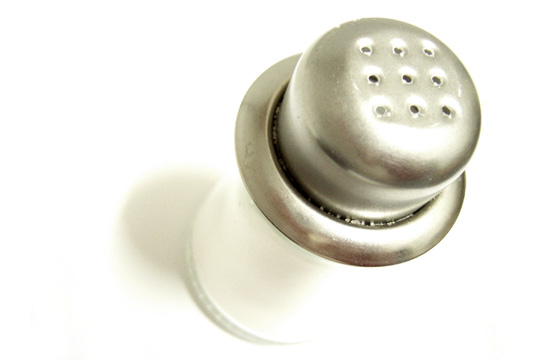
Reducing Food Waste in Foodservice
October 16, 2018 by Doreen Garelick, Dietetic Intern
Our intern Doreen attended a food waste summit for restaurants and compiled these tips to help food service operators redirect…
News Commentary, Nutrition 101
May 16, 2013

Senior Culinary Nutritionist Andrea Canada comments on a recent report from the Institute of Medicine concerning low sodium intake.
The Institute of Medicine released a report this week examining the effect of low sodium diets on the U.S. population. I’ve written a few times previously about the risks of a high-sodium diet, but research is also being carried out to determine how consuming too little sodium can affect the human body.
Currently, the USDA’s Dietary Guidelines recommend 2,300mg of sodium per day for the general population. However, the Dietary Guidelines recommend only 1,500mg of sodium for at risk populations including people with high blood pressure (hypertension), diabetes, kidney disease or congestive heart failure, anyone 51 or older and African Americans. This far more restrictive recommendation sparked controversy, prompting the IOM to evaluate the most recent research.
So what were the report’s findings? In examining studies of the general population, the report concluded the following:
The report’s more controversial conclusions are for those subgroups mentioned above:
Consensus scientific evidence should be required for any of the USDA’s dietary recommendations, especially as these are the requirements that publicly funded programs such as senior centers are challenged to adhere to. However, given that most Americans consume well over the 2,300mg recommendation (which the IOM conclusions supported), it doesn’t seem like the country is in danger of too little sodium. So while industry groups are touting the report as vindication, public health groups are rightfully concerned that the coverage surrounding it confuses their message.
Do you think the messages surrounding sodium intake are confusing? Let us know your thoughts in the comments section below.

October 16, 2018 by Doreen Garelick, Dietetic Intern
Our intern Doreen attended a food waste summit for restaurants and compiled these tips to help food service operators redirect food waste from landfills.
Nutrition 101

Nutrition 101
September 26, 2018 by Doreen Garelick, Dietetic Intern
Ever notice headlines about rapid weightloss? Dietetic Intern Doreen Garelick looks deeper into a recent eye-catching headline to see if there's any truth behind it.
Connect
 Follow us on Twitter
Follow us on Twitter Friend us on Facebook
Friend us on Facebook Follow us on Pinterest
Follow us on Pinterest Follow us on Instagram
Follow us on Instagram Read our Blog
Read our Blog Watch videos on YouTube
Watch videos on YouTube Watch videos on Vimeo
Watch videos on Vimeo Connect with us on Linkedin
Connect with us on Linkedin Find us on Foursquare
Find us on Foursquare
Tweets by @SPEcertifiedBlog Search
Categories
SPE Certified Newsletter
Sign up for news on the latest SPE-certified venues, events and SPE updates.
We will never share your personal information with a third party.